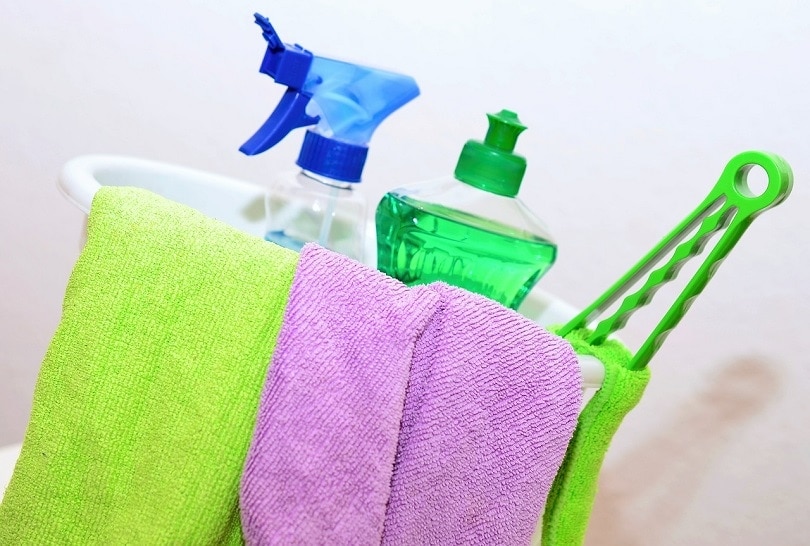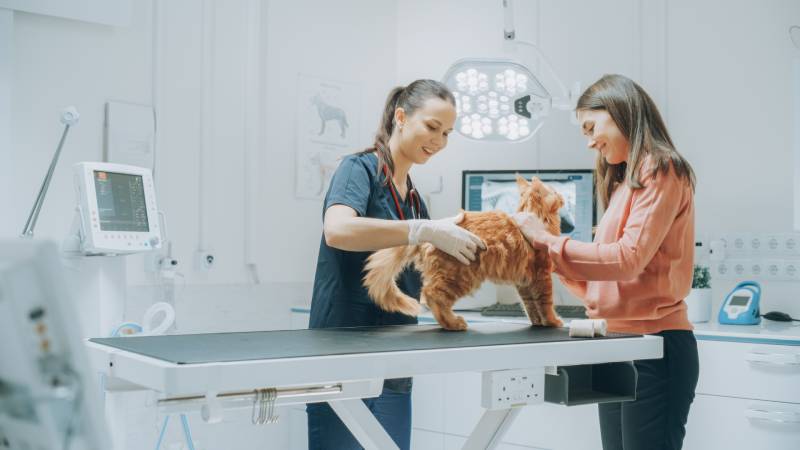Why Does My Dog Chew His Paws? 6 Reasons (Vet Answer)

Updated on
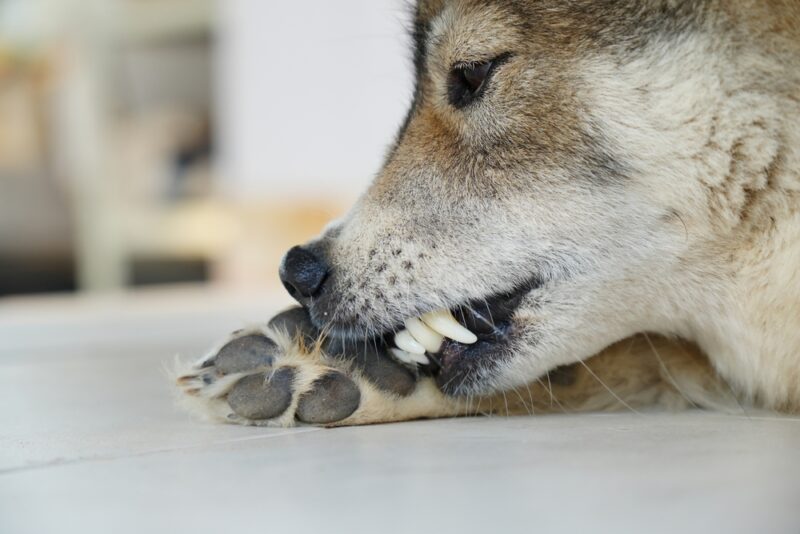
Have you noticed your dog chewing his paws? It is a very common habit, and it does not always mean something bad is going on. Dogs chew their paws for several reasons—they may be cleaning themselves, it can be a habit that has developed over time, they may be anxious or stressed, they may have sustained an injury, there may be an infection present, or they may have an allergy.
If they suddenly start chewing their paws this can mean there is something wrong and you need to get an appointment with your vet to have them checked over. Your vet will be able to find out the reason they are chewing and be able to make an appropriate treatment plan.
This article discusses the main reasons for paw chewing and what to do in these situations.
The Possible 6 Reasons Why Dog’s Chew on Their Paws
1. Cleaning
Dogs lick and gently chew their paws as a normal self-cleaning routine. After they have been for a walk, or a visit to the garden, they will often settle down and lick/chew themselves. They will be removing any sand, dirt, or other debris from their paws and in between their pads.
Be aware that occasional licking and chewing is a normal part of their self-grooming routine, but if they start excessively licking and chewing, this is not normal, and you need to take them to your vet.
2. Allergies
One of the most common causes of dogs chewing their paws is allergies. Allergies can be to something in their environment such as plants or pollens, molds, dust mites, parasites, or food protein in their diet.
Dogs can react to just about anything they are exposed to in their environment including things in the air, on surfaces they come into contact with, chemicals on their bedding or furniture, and carpets or plant species. Signs of allergies are commonly seen on dogs’ feet if they suffer from environmental allergies as they have contact with lots of different things during their day. One of the more commonly seen signs is itchy, inflamed skin on and around the paws. You may see redness and irritated areas elsewhere on your dog too. If your dog develops dermatitis, which is where the skin becomes inflamed, topical and systemic treatment is often required.
There are different options for the treatment of allergies. Usually, they involve identifying and removing the offending allergen from your dog’s environment. Allergy testing can be done on your dog’s skin or by blood tests. Once the results have been analyzed your vet is able to use immunotherapy if appropriate. This slowly desensitizes your dog to the allergens they react to over time. It can be given as an injection or under the tongue as oral drops.
Some drugs such as oclacitinib (Apoquel) and Lokivetmab (Cytopoint) work by blocking certain chemical signal pathways involved in allergic reactions.
There are also topical and oral treatments that are aimed at alleviating allergy symptoms such as steroids. If food allergies are suspected, an elimination diet trial is recommended. This involves feeding your dog a novel or hydrolyzed source of protein for a minimum of 8 weeks then slowly introducing different foods back in and monitoring for a reaction.
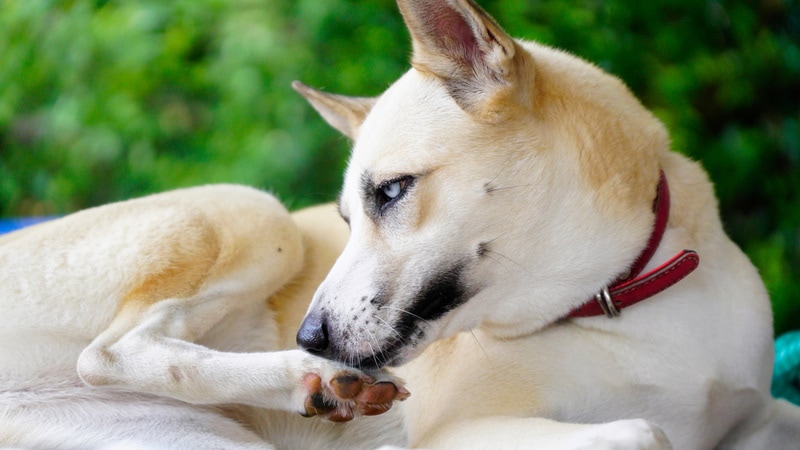
3. Stress and Anxiety
Your dog may be expressing stress or anxiety by chewing their paws excessively. Different dogs respond to situations in different ways and stressors in a dog’s environment can cause them to become anxious. This can be simple things like being left for too long on their own, or more dramatic things such as the introduction of a new family member, loud sudden noises like building work or fireworks, and moving home.
Lots of dogs develop compulsive behavior as a coping mechanism for their anxiety. Some dogs may bark excessively, others will destroy things in their environment, and others will lick and chew their paws to soothe themselves. If you suspect anxiety is the cause of your dog’s paw chewing, you need to rule out any underlying health issues. A trip to your vet will be the first port of call. When you are satisfied that there is nothing physically wrong, you need to start investigating the causes of anxiety.
- Less time alone
- More positive play interactions
- More frequent/longer walks
- Chew toys/puzzle toys
- Environment enrichment
Regular interaction and good quality, age-appropriate exercise are important for your dog’s physical and mental health. If you ensure your dog is getting enough of these things, this usually resolves any unwanted compulsive behavior.
4. Parasites
Parasites are a very common cause of paw chewing in dogs. The culprits are usually fleas, mites, and ticks. They make your dog very itchy and your dog will chew and lick their paws to attempt to relieve the itching. If left untreated, parasite infestations can cause serious health issues. To detect fleas, you can run a fine-toothed comb through the fur and rub it onto a wet piece of tissue. The comb picks up the flea droppings and they will appear as little dark specs on the tissue with red rings around them.
Mites are a lot smaller so more difficult to see, but you will be able to see scaling, crusting, redness, and inflammation. Ticks are larger, especially if they have had a feed from your dog. In this case, they will be swollen and engorged, and some can be up to 1.5cm (0.5 inches). It is always recommended to keep up to date with parasite treatment. Make sure to source them from your vet as they will be able to advise which are most suitable for the age and weight of your dog.
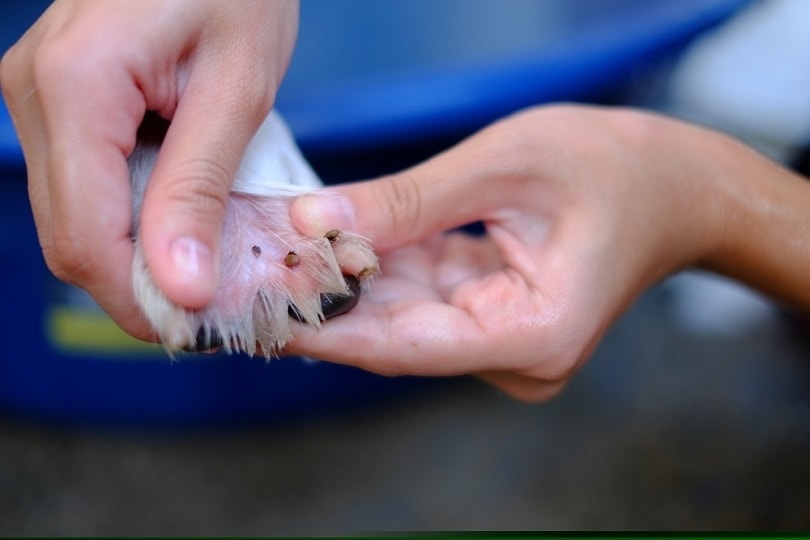
5. Pain
As your dog’s paws will have almost constant contact with different surfaces throughout the day as they move about, it is very easy for them to pick up injuries. Pain in the area will cause your dog to chew and lick their paws frequently.
- Broken claws: A dog’s claws can easily get bent or snapped if they get caught. Sometimes the claw is damaged but still attached, this can be very painful. Dogs can also experience nail bed infections.
- Ingrown claws: If your dog’s nails are allowed to grow out too long, they can curl back into the pad and cause immense discomfort. Your dog’s dew claws don’t get worn down so special attention needs to be paid to them.
- Cuts: Lacerations on sharp objects such as glass or stones can occur. Often, they bleed profusely and take a long time to heal if the pads are involved. Cuts can easily become infected, and ulcers can form.
- Interdigital Pyoderma: Cyst-like swellings can appear in between your dog’s toes. They can easily get infected and cause a lot of pain.
- Foreign bodies: Sharp objects can penetrate your dog’s foot or enter through open wounds. They can become stuck inside, causing a foreign body reaction. This can include glass, stones, sticks, and grass seeds.
- Fractures: Dogs may fracture bones in their feet. Some fractures can be subtle, and not cause many clinical signs whereas some are painful and are very obvious.
If you think your dog is in pain, get your vet to check them over. They are likely to require pain medication and possibly antibiotics depending on the cause of the pain.
6. Dry Skin
If your dog has dry skin, you will often catch them chewing and licking their paws. Your dog’s diet can affect how dry their skin is, as can their external environment. If your dog is not getting a balanced diet with enough fatty acids, this can make their coat and skin dry. Bathing and shampooing your dog too frequently and leaving the shampoo on for too long can cause your dog’s skin to dry out as well. Not cleaning your dog’s feet after muddy walks and letting the mud and dirt dry on their paws can also dry out the skin.
You can buy dog foods with all of the necessary fatty acids included, or supplements are also available. Ensure they are always well hydrated, wash muddy or dirty paws after walks, and always follow the instructions on shampoo bottles and ensure you are not using them too frequently.
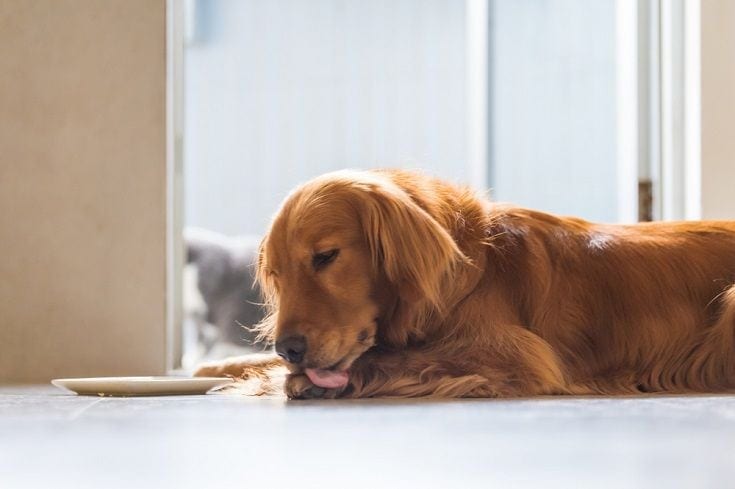
Conclusion
There are many good reasons dogs lick and chew their paws. Often it is normal behavior and a routine part of their cleaning regime. Excessive chewing and licking are not normal, and indicative of a problem. If you notice your dog suddenly starts chewing their paws, arrange an appointment with your vet.
Featured Image Credit: KPhrom, Shutterstock



